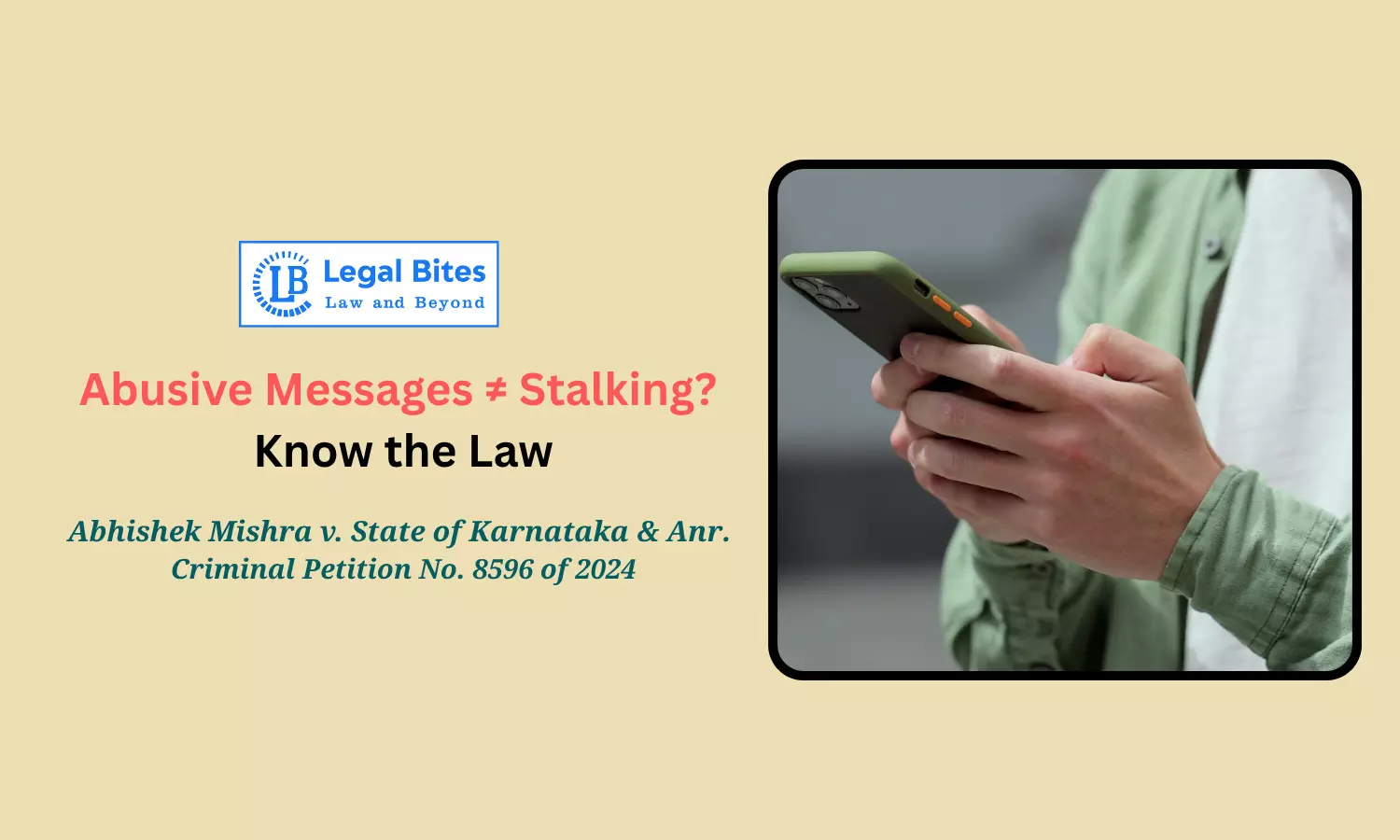Can Sending Abusive Texts Alone Be Considered Stalking?
Karnataka High Court ruled that abusive messages alone don’t amount to stalking unless they involve persistent unwanted contact. Know the legal reasoning.

Stalking is a serious offence under the Indian Penal Code (IPC) and the Information Technology (IT) Act. With the digital era transforming interpersonal relationships, courts are increasingly faced with cases involving virtual harassment, such as repeated text messages, emails, and social media surveillance. But a nuanced legal question arises: Is sending abusive or threatening messages by itself enough to constitute stalking? The Karnataka High Court addressed this very issue in the recent case of Abhishek Mishra v. State of Karnataka & Anr. (Criminal Petition No. 8596 of 2024, decided on 8 July 2025)
Background of the Case
The petitioner, Abhishek Mishra, sought to quash the criminal proceedings initiated against him under various sections of IPC and IT Act, including Section 354-D (stalking). The complainant, Pinki Sharma, alleged that the petitioner had repeatedly contacted her, followed her friends, used abusive language over calls, and threatened to release private photos and videos allegedly taken during a consensual relationship.
The charges included:
- Section 354-C and 354-D of IPC (Sections 77 and 78 of BNS) (Voyeurism and Stalking),
- Section 504, 506, 509 of IPC (Section 352, 351, 79 of BNS) (Intentional insult, criminal intimidation, and insult to modesty),
- Section 66-E of the IT Act (Violation of privacy), and
- Section 3(2)(v) of the SC/ST (Prevention of Atrocities) Act, later dropped during investigation
Understanding Stalking Under Section 354-D IPC (Now, Section 78 BNS)
Section 354-D IPC defines stalking as:
- Following a woman and contacting, or attempting to contact, her repeatedly despite clear signs of disinterest; or
- Monitoring her internet or electronic communication use.
Stalking is a gender-specific offence, applicable when a man harasses a woman repeatedly, either in person or digitally, with an intention to establish personal interaction.
The law includes exceptions such as:
- If the man is acting under a legal obligation,
- If he is a law enforcement officer preventing crime,
- Or if the act is otherwise reasonable and justified.
Judicial Reasoning in Abhishek Mishra v. State of Karnataka
Justice M. Nagaprasanna, while adjudicating the petition, examined whether sending abusive messages alone would constitute the offence of stalking. The Court emphasised:
“Merely sending messages with foul language cannot constitute the offence of stalking as defined under Section 354-D IPC.”
The Court highlighted that for an act to qualify as stalking, it must involve:
- A pattern of repeated behaviour, and
- The intention is to foster personal interaction despite disinterest.
While abusive messages may fall under other penal provisions (e.g., Sections 504 or 506 IPC), they do not per se fulfil the criteria for stalking unless coupled with the element of unwanted pursuit or contact with a specific objective
Role of Consent and Privacy
In this case, the complainant and the petitioner had a consensual relationship, which later deteriorated. Allegations of blackmail based on private content surfaced, and charges under Section 66-E of the IT Act were pressed.
Section 66-E penalises the unauthorised capture or dissemination of private images without consent, especially those depicting intimate or private acts. This offence, unlike stalking, does not require repetitive behaviour—one instance of privacy breach can suffice.
Thus, while the act of sending or threatening to share such material may not always amount to stalking, it can constitute separate crimes like voyeurism (Section 354-C IPC) or violation of privacy (Section 66-E IT Act)
Comparative Case Reference
The High Court referenced the Delhi High Court judgment in Sonu v. State (2023 SCC OnLine Del 1955), which clarified the scope of voyeurism and stalking. It emphasised that the victim's reasonable expectation of privacy is central in voyeurism cases, while stalking hinges on repetitive, intrusive pursuit
Similarly, in Veerabhadra Swamy S. v. State of Karnataka (Crl.P.2396/2024), the Karnataka High Court held:
“Voyeurism involves watching or capturing images of a woman engaged in private acts in places where privacy is reasonably expected.”
These cases reiterate that isolated abusive texts, however offensive, do not satisfy the statutory ingredients of stalking, unless they show a clear pattern of persistent, unwanted contact.
Other Relevant IPC Provisions in the Case
The Court assessed other invoked provisions to determine their applicability:
- Section 504 IPC (Section 352 BNS) – Intentional insult to provoke breach of peace.
- Section 506 IPC (Section 351 BNS) – Criminal intimidation, especially if threats involve grievous harm or reputational damage.
- Section 509 IPC (Section 79 BNS) – Insulting a woman’s modesty through gestures, words, or actions.
The abusive language used over calls and texts could potentially fall under these sections. However, the primary concern was whether they individually or cumulatively amounted to stalking, which the Court rejected in the absence of a sustained pattern or intent to foster unwanted interaction.
Abuse of Legal Process
Justice Nagaprasanna also expressed concern about the misuse of legal provisions. The Court noted that allegations of rape (Section 376 IPC) (Section 64 BNS) and cheating (Section 420 IPC) (Section 318 BNS) were eventually dropped during the investigation. The judge emphasised that:
“The criminal process should not become a tool of vengeance or harassment, especially when the dispute arises from a soured personal relationship.”
The Court quashed proceedings under Section 354-D IPC but allowed prosecution to continue for other valid charges like voyeurism and violation of privacy.
Key Highlights of the Decision
Justice Nagaprasanna stated
"The case at hand, as observed hereinabove, except the offence of stalking, revolves round seriously disputed questions of fact, which would require further proceedings before the concerned Court. Therefore, I decline to exercise my jurisdiction under Section 482 of the Cr.P.C., to obliterate the proceedings qua all offences except the offence under Section 354D – stalking, as permitting further trial qua the said offence would undoubtedly become an abuse of the process of law."
Legal and Social Implications
The ruling sets a clear precedent on what constitutes stalking in digital interactions:
- Not all offensive or threatening communications will qualify.
- The mental element (mens rea) to engage persistently despite refusal is key.
- The repetitive nature of conduct must be established through evidence.
From a social perspective, this judgment strikes a balance between protecting victims of online harassment and preventing overcriminalization of emotionally driven interpersonal disputes.
Conclusion
The Karnataka High Court in Abhishek Mishra v. State of Karnataka & Anr. has drawn a crucial distinction between digital abuse and digital stalking. While both are condemnable, only the latter meets the rigorous legal threshold under Section 354-D IPC when intent, persistence, and disregard for disinterest are demonstrably present.
Sending a single abusive or threatening message may violate privacy, modesty, or public decency laws, but it does not, in isolation, constitute stalking.
This decision serves as a guiding light for both the judiciary and law enforcement, ensuring that justice does not succumb to emotional overreach and that criminal law maintains its principled clarity.
Important Link
Law Library: Notes and Study Material for LLB, LLM, Judiciary, and Entrance Exams

